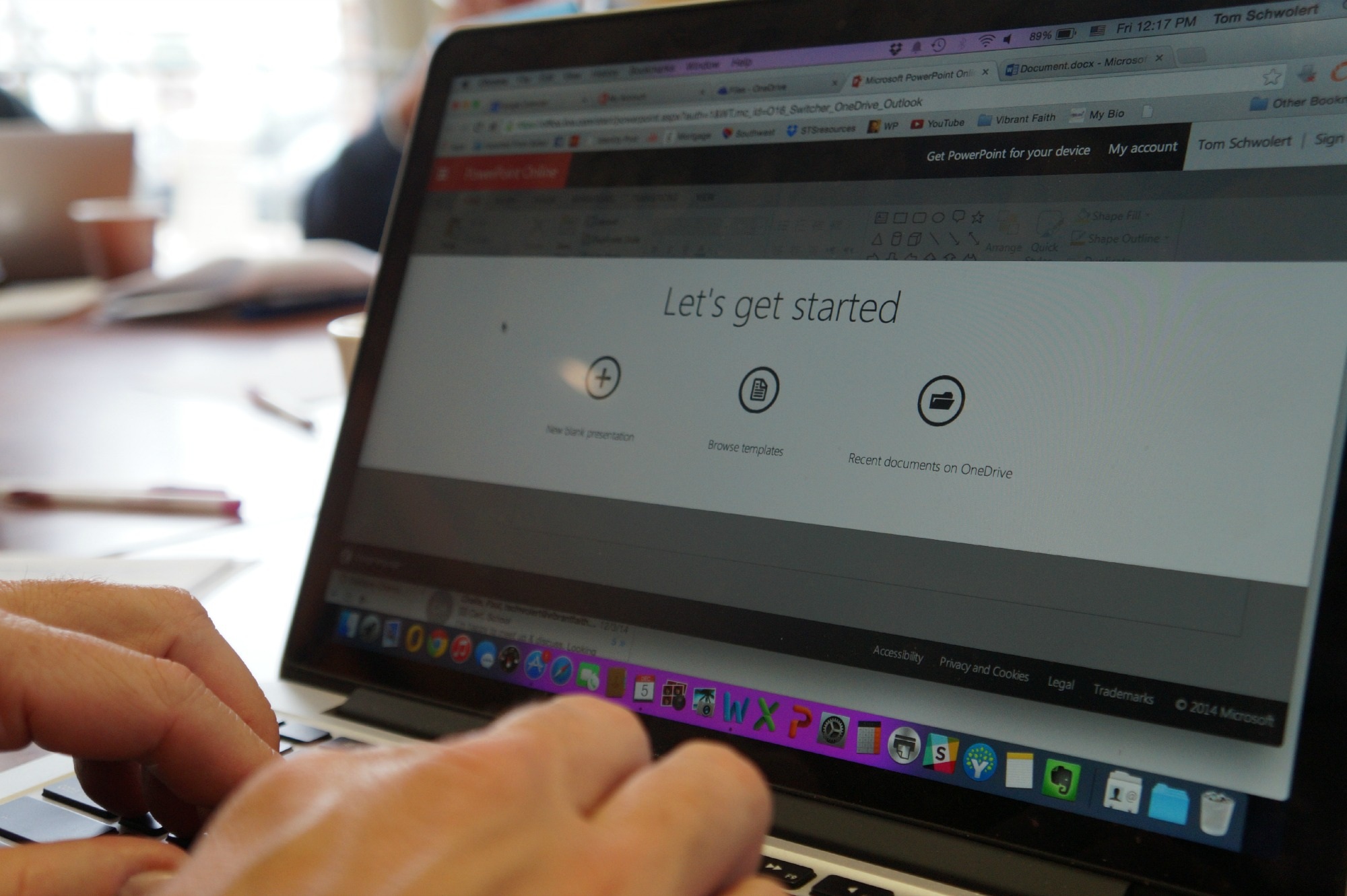How To vs What If
Building your Creative Strength OR Stretching Your Creativity
 As the global economy drives fast out of the era of knowledge into a new economic landscape, companies like Google and Apple are leading the way leaving those who fail to embrace the change lifeless in their dusty tracks.
As the global economy drives fast out of the era of knowledge into a new economic landscape, companies like Google and Apple are leading the way leaving those who fail to embrace the change lifeless in their dusty tracks.
For the last two decades, corporate competition has been driven by market efficiency. Companies have gotten ahead of their opponents by accumulating the knowledge necessary to lower their costs and reduce their inputs. It was the race of processes and information that was the competitive advantage.
Knowledge became a company's power, and the company who held the most dominated the stock market.
5 Tips to Start a Successful Online Business in Australia
 The Internet has made it possible for entrepreneurs to launch business ideas without the need of any brick and mortar structure. Digital technology opened up a virtual world of opportunities with a market size of more than three billion users.
The Internet has made it possible for entrepreneurs to launch business ideas without the need of any brick and mortar structure. Digital technology opened up a virtual world of opportunities with a market size of more than three billion users.
Within the first five years of the new millennium the website had evolved from a marketing, information platform to different incarnations. Entrepreneurs were using websites to host and run their businesses online.
One of the fastest growing online business industries is in Australia. A study published in 2013 showed that from 2010 to 2012 alone, there was a 200% growth in the number of online businesses in Australia. The growth in the industry corresponded with the increased expenditure of Australians. From 2011 to 2012, the average online transaction of an Australian grew from $118 to $142, far higher than the global average of $116.
Is your email exchange a binding contract?
 Email exchanges are increasingly being viewed by the Courts as another way of creating legally binding contracts.
Email exchanges are increasingly being viewed by the Courts as another way of creating legally binding contracts.
This should be a worrying realisation for anyone who has casually exchanged emails with someone where a legally binding agreement has been discussed. In an increasing number of cases the Courts have deemed agreements to have been made even when the parties included expressions like "subject to contract" or "subject to formal approval".
Many kinds of binding agreements have been made by email: sale of land agreements, lease agreements, and even settlement agreements between solicitors.
While it is legally uncertain whether some exchanges will constitute a binding agreement, the Courts have said many times that regard must be had for all the circumstances and conduct regarding the alleged agreement. No excerpt can be solely relied upon.
Legal health check for start-ups and early stage businesses
 Getting your business 'legals' right from the start is the easiest way to avoid disputes down the track and ensure its long term success.
Getting your business 'legals' right from the start is the easiest way to avoid disputes down the track and ensure its long term success.
Thankfully, it is now easier and less costly than you might think to implement the documents start-ups most commonly need to protect their intellectual property, manage their website, and underpin their business structure.
For more information, check out this article from Chamberlains Law Firm on legal health checks for start-ups and small business.
Will it hurt? The team practice that is more than good medicine
 When we look at teamwork, the ideal state for many people is 'pain free', or in other words, 'free of conflict'.
When we look at teamwork, the ideal state for many people is 'pain free', or in other words, 'free of conflict'.
Yet under the surface, issues can brew that threaten to derail the team's health completely.
We can't underestimate this reality enough. In the absence of healthy conflict, issues are not only more likely to brew but also more probable and even predictable.
They say you can't choose your family. Similarly the majority of the workforce doesn't have the option to choose their work colleagues.
The workplace is naturally a place where people of varying interests, personalities, thinking styles, action styles and walks of life come together. This diversity leads to conflict, as naturally as night follows day.
5 Quick (but effective!) Flexible Work Options
 Flexible workplaces are becoming increasingly sought-after, especially for employees who are busy at work and after hours.
Flexible workplaces are becoming increasingly sought-after, especially for employees who are busy at work and after hours.
Unknown to many companies is the fact that a flexible workplace benefits both the company and its employees, making everyone happy.
It is ultimately in everyone's best interest to offer flexible workspaces.
Here are five options that could help you easily reap the benefits of flexible work.
Remote Work Powers Their Success
 In days gone by, employers saw flexible working arrangements as a cost to the business.
In days gone by, employers saw flexible working arrangements as a cost to the business.
Today, some clever businesses are reinventing the way they work by teleworking, which is working remotely.
Telework increases staff commitment and productivity and delivers fantastic business outcomes.
Ruth MacKay is the Managing Director at OURTEL Solutions, a virtual call centre provider serving the Australian business community since 2008. Ruth has around 30 staff members who work from locations across Australia and New Zealand.
Block the drain on your productivity: High-performance Outsourcing
 Many business owners know that the growth of their businesses is limited by one person: themselves. Try as they might, eventually every business owner is frustrated by their own limitations.
Many business owners know that the growth of their businesses is limited by one person: themselves. Try as they might, eventually every business owner is frustrated by their own limitations.
As busy entrepreneurs we often delay strategically important work, while low-value tasks such crowd out our schedules.
To get around this, the most obvious strategy is to work longer hours. Nonetheless, organisations such as Stanford, the Economist and Harvard Business Review have shown that longer hours don't actually increase output.
For example, the Economist recently showed that output remained stable after about 48 hours per week. Longer hours are a drain on productivity and not the smartest way to get everything done.
Goodbye Teamwork Woes: How to banish them for good!
 Building the right team is one of the key requirements for any business, government or not-for-profit to be successful.
Building the right team is one of the key requirements for any business, government or not-for-profit to be successful.
Great leaders can point the way but there is only so much a leader can achieve on their own - it is great teams that achieve success.
In this series we are going to look more closely at how to build strong teamwork and collaboration, what organisations do wrong and how to avoid the pitfalls. I'll show you how to banish your teamwork woes for good.
What is the most foundational reason that teams fail?
Flexible Work - It's not just staff who benefit!
 Whether or not today's businesses recognise it, flexible work is now the number one tool for reducing office and workforce costs, and for doing 'more with less'.
Whether or not today's businesses recognise it, flexible work is now the number one tool for reducing office and workforce costs, and for doing 'more with less'.
Just as technology has become an increasingly important part of the workplace in the past decade, there is a similarly helpful tool now at our disposal.
It is now easier for businesses to tap into the potential of flexible work, thanks mainly to our new ability to stay remarkably connected. As a result, working in other locations for part (or all) of the time is now cheap and accessible. New factors are also driving employees' increasing interest in flexible work: more households are dual-earners, travel times have increased in our large cities and stress levels are on the rise.
New rules for Employee Share Schemes: what do the changes mean for your start-up?
 The taxing rules for Employee Share Schemes ('ESS') in relation to start-ups significantly changed on 1 July 2015.
The taxing rules for Employee Share Schemes ('ESS') in relation to start-ups significantly changed on 1 July 2015.
An ESS is a scheme where shares or options in a company are provided to its employees.
The new tax concessions provide a positive incentive for employees of start-up companies to participate in an ESS giving start-ups a flexible way to attract and retain staff when funds are tight.
How to be super efficient on social media
 While there was once a time where businesses used to struggle to accommodate for social media, we are now faced with the case of allocating too much time to it.
While there was once a time where businesses used to struggle to accommodate for social media, we are now faced with the case of allocating too much time to it.
An IPSOS study has found that, on average, we're spending 3.5 hours on social media a day – that's roughly 16 minutes out of every hour, or approximately a quarter of our total waking time.
With stats such as these, there's almost no denying that we've become slaves to social media, without us even realising and being party to that decision.
With only so many hours in the day to get tasks done and a myriad of social channels to manage and monitor, we can't afford to keep such inefficiencies.
How to live and work when technology accelerates change
 "The forces currently at play in today's workforce will change what it means to work and live."
"The forces currently at play in today's workforce will change what it means to work and live."
In any other era this might have seemed an overstatement. In the current Information Age, the capacity for disruption, volatility and uncertainty in the workforce is greater than ever.
Five steps that can strengthen your team
 Is your major concern with managing your people ensuring productivity?
Is your major concern with managing your people ensuring productivity?
Almost every manager in the country has the same concern.
Here are five ways to ensure that your team stays productive:
1. Review Performance often and openly
Performance management conversations can be stressful for both managers and employees, even when everything is going well. Nonetheless, reviewing performance more often and openly can go a long way towards taking the heat out of giving feedback. Employees can be concerned that their good work isn't being noticed, while managers can sometimes discover concerns and issues that would otherwise remain unnoticed.
Work is always most productive when performance is discussed more often. The golden rule for performance management is "no surprises", which can easily be achieved when you give open feedback often.

